八年级英语上册Unit1Wheredidyougoonvacation第3课时习题课件新版人教新目标
八年级英语上册Unit1Wheredidyougoonvacation第3课时教案
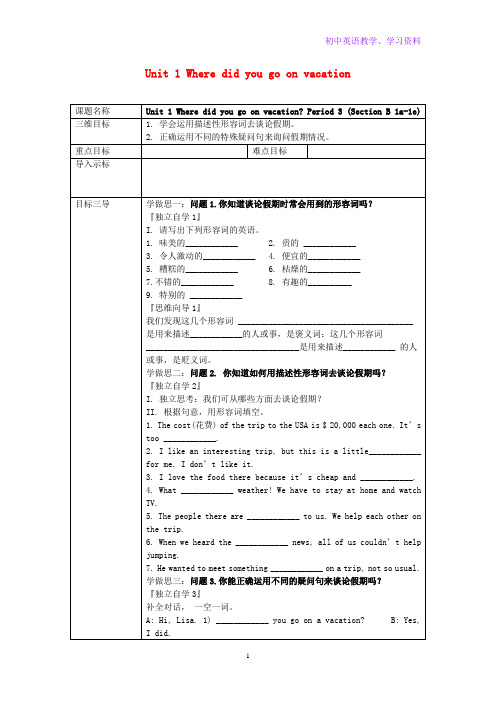
8. Did you buy____________(something) from theUSA?
9. Would you like____________(something) to drink, Jack?
10. Everything tastes very____________(well).
7.不错的____________8. 有趣的__________
9. 特别的 ____________
『思维向导1』
我们发现这几个形容词 ________________________________________是用来描述____________的人或事,是褒义词;这几个形容词___________________________________是用来描述____________ 的人或事,是贬义词。
Unit 1 Where did you go on vacation
课题名称
Unit 1 Where did you go on vacation? Period 3 (Section B1a-1e)
三维目标
1. 学会运用描述性形容词去谈论假期。
2. 正确运用不同的特殊疑问句来询问假期情况。
重点目标
A. EveryoneB. No oneC. AnyoneD. Someone
章节: 课时: 备课人: 二次备课人:
2016秋人教版8年级英语上册Unit 1 教案

Unit 1 Where did you go on vacation ?第|一课时Section A (1a~2d)【学习目标】1.学生学会关于假期去旅行的一些常用词汇与句型,并学会复合不定代词的用法.2.通过与学生交流假期去哪里旅行的话题,提升学生的语言交际能力.3.学生会用一般过去时态进行信息交流,形成环保意识,热爱大自然.【学习重点】学生能用所学的功能语言交流假期去了什么地方旅行.【学习难点】学习复合不定代词someone ,anyone ,something ,anything等的用法.Learning action tips: leading in by showing PPT about the students ,holiday trip.Topics:Did you have a good time during the vacation ?Yes ,I did. Did you go anywhereinteresting with your parents ?Can you tell us where you went on vacation ?……Review the past tense.Task 1Learning action tips: Preview the words on Page2 in the word list. Students read the words by phonetic symbols, then underline new words in the text and mark the Chinese meaning. At last finish the task in 1a.【知识链接】1.复合不定代词有:某人someone任何人anyone没有人no one每个人everyone某事something任何事anything没有东西nothing一切everything2.anyone与any one的区别anyone通常指人,侧重于个体,后面不带of;any one既指人,又指物,侧重于整体,后面可接of .情景导入生成问题1.T:Did you have a good time during the vacation?S:________________________________________________________________________ 2.T:Where did you go on vacation?S:________________________________________________________________________ 自学互研生成能力Task 1Let's read the new words and the phrases.1.I can read.(我会读)anyone ,anywhere ,wonderful ,quite a few ,most2.I can write.(我会写)翻译以下短语:(1)待在家里stay__at__home(2)去纽约城go__to__New__York__City(3)去夏令营go__to__summer__camp(4)与某人一起去go__with__someone(5)buy something special买特殊的东西(6)遇见有趣的人meet__someone__interesting(7)study for tests为考试学习3.I can summarize.(我会总结)Did you buy anything special ?其中anything 是不定代词.复合不定代词用法小结:(1)带some的复合不定代词常用于肯定句中;带any的复合不定代词常用于否认句或疑问句中.(2)当形容词修饰不定代词时,应放在其后面.(3)复合不定代词作主语时,都作单数看待,其谓语动词用第三人称单数形式.(1)I did something interesting last summer.去年夏天我做了有趣的事情.(2)Did you go anywhere cool on vacation ?假期你去凉爽的地方了吗?(3)在那里我没见到人.I didn ,t see anyone there.Task 2Let's listen to the tape and finish 1b ,2a ,2b.Task 3Let's make conversations and interview.1.I can practice.(我会练)A:Grace ,where did you go on vacation?B:I went to (1)Central__Park((中|央)公园).A:Oh ,really ?Did you go with anyone?B:No.No__one(没有人)was here. Everyone was on vacation.A:Did you buy (3)anything__special(特殊的东西)?B:bought nothing.【导练】( C )Did you see ______ in the dining room?A.someone B.some oneC.anyone D.any oneTask 2Learning action tips:1.Students turn to Page1 and listen to the tape, finish the listening task in 1b. Students listen to the tape again and repeat.2.Students turn to Page2 and listen to the tape, finish the listening tasks in 2a and 2b. Then students listen again and repeat.【Method coach】听录音时,要求学生注意用笔标记:(1)断句:"|〞(2)语调:升调降调(3)重读单词:△(4)不会认读的单词:____模仿纯粹的语音语调,朗读听力材料,培养学生的语言交际能力.Task 3Learning action tips:Students read aloud the dialogue in 1c, 2c and 2d, make dialogues andhave a conversation practice with "-Where did you go on vacation? -I went to…〞. Then interview classmates and have a report.【备注】2.I can make conversations.(我会编对话)你能结合课文1c ,2c及2d的内容编写对话来介绍自己假期活动的情况吗?运用句型Where did you go on vacation ?Did you go with anyone?A:Lily ,where__did__you__go__on__vacation?B:I__went__to__the__beach.A:Sounds__great !Did__you__go__with__anyone?B:Yes ,I__went__there__with__Li__Lei.3.I can interview and report.(我会采访和汇报)Oral report:In our group/ class, Wang Yang went to the countryside with her mother on Hui went to the mountains with his classmates on had a good Ma Shiyi didn ,t go anywhere on vacation. She had to stay at home and look after her sick grandma.交流展示生成新知Preshow:Show in groups. (Time: six minutes)Task 1:First read the words and phrases in groups ,then read together and sum up the usage of the words in groups ,mark the difficult words in pronunciation and understanding(students can ask teacher for help).At last ,write them on the blackboard.Task 3:First discuss and check the answers of Task 3 in groups, then discuss and set scenes to perform the dialogues ,interview classmates about the holiday activities. At last ,write them on the blackboard.Promotion show: Class show. (Time:sixteen minutes)Task 1: can read.(1)Read together ,pay attention to the pronunciation of "wonderful〞;(2) Consolidate the words by word games.2.I can write.(1)Translate the phrases into English or Chinese by answering quickly;(2)Read together;(3)Spot test:consolidate the usage of the phrases by making sentences.3.I can summarize.(1)Sum up the usage of the Compound Indefinite Pronoun with the phrases in "I can write〞;(2)Spot test:consolidate the usage of the Compound Indefinite Pronoun with the exercises ,then check the answers by answering quickly and explain.Task 3: can practice.(1)Choose some students to translate the key sentences in Task 3;(2)Read together.2.I can make conversations.(1)Make dialogues according to the task;(2)Set scenes to perform the dialogues;(3)Question students randomly according to the dialogues.3.I can interview and report.(1)Interview students with the structure "Where did you go on vacation ?〞,show them on the blackboard in diagram;(2)Report the holiday activities in oral.当堂演练达成目标根据句意和汉语提示填写单词.1.This question is very easy.Everyone(每个人)can answer it.2.Did you go anywhere(任何地方)quiet?3.Huangguoshu Waterfall was very wonderful(绝|妙的).4.Tony has a few(一些)story books.5.Most(大多数)of the students in our class like sports.课后反思查漏补缺收获:________________________________________________________________________ 存在困惑:________________________________________________________________________第二课时Section A (Grammar Focus~3c)【学习目标】1.学生能学会关于假期去旅行的一些常用词汇与句型,并学会归纳总结反身代词的用法.2.通过与学生交流假期去哪里旅行的话题,提升学生的阅读填空能力.3.学生会用一般过去时态进行信息交流,提升学生热爱大自然的意识.【学习重点】用所学的功能语言,与学生交流假期去了什么地方旅行.【学习难点】学习反身代词myself ,yourself等的用法以及提高学生阅读填空的能力.Learning action tips:Revise the contents learned to practice students' listening.Teacher:Now, please listen to me carefully and answer my went to Qingdao last went there with my was my first time to go there ,so everything was really I bought something for my friends ,but I didn ,t buy anything for myself.Task 1Learning action tips:1.Preview the words on Page3 in the word list. Students read the words by phonetic symbols,then underline new words in the text and mark the Chinese meaning.2.Students read and translate the sentences in Grammar Focus on Page3.【Method coach】▲The only problem was that there was nothing much to do in the evening but read.唯一的问题是晚上除了看书没有什么事可做.此句中that there was…是表语从句.There be do意为 "有……要做〞.but read意为 "除了读书〞.nothing意为 "没有任何东西〞,是否认词 .相当于not…anything .情景导入生成问题1.T:Where did I go last vacation?S:________________________________________________________________________ 2.T:Did I go there with anyone?S:________________________________________________________________________ 3.T:Did I buy anything for myself?S:________________________________________________________________________ 自学互研生成能力Task 1Let's read the new words and the phrases.1.I can read.(我会读)something ,nothing ,everyone ,of course ,myself ,yourself ,hen ,pig ,seem ,bored ,diary2.I can write.(我会写)翻译以下短语和句子:(1)当然of__course(2)在乡下in__the__countryside(3)记日记keep__a__diary(4)买东西给某人buy__sth.__for__sb./buy__sb.__sth.(5)没有人在这儿. No__one__was__here.(6)大家都去度假了. Everyone__was__on__vacation.(7)我给我爸爸买了些东西 . I__bought__something__for__my__father.(8)每样东西尝起来都很好 . Everything__tasted__really__good.(9)大家都玩得很快乐吗?Did__everyone__have__a__good__time?(10)唯一的问题就是在晚上没有什么事情可做,只能读书.The__only__problem__was__that__there__was__nothing__much__to__do__in__the__evening__but__read.3.I can use.(我会用)(1)buy sb.sth.=buy sb.为某人买某物(2)quite a few+可数名词的复数(3)①seem to do sth./be②seem+adj.(形)③It seems that…似乎/好似……,有时可与seem to do sth.相互转换.(1)Mom bought Lucy a storybook.(同义句)Mom bought a storybook for__Lucy.(2)There are quite__a__few__cars (相当多的汽车)in the street.(3)He seems tired__/__to__be__tired(累;疲倦).Task 2Make conversations and make a survey according to 3c.1.I can practice.(我会练)A:Did you do (1)anything__fun on your vacation ,Alice?B:Yes ,I went to (2)Sanya(三亚).A:How do you like it?B:Well ,it is my (3)first__time(第|一次)there ,so everything was really(4)interesting.A:Did you (5)buy anything (6)for yourself(为你自己买了东西)?B:(7)Nothing ,but I bought (8)something for my parents.2.I can try.(我会试)Finish the task 3a and 3b on Page 3.【导练】Jack is new here ,so we don ,t know anything about him.(改为同义句)Jack is new here ,so we know __nothing__ about him.Task 2Learning action tips:1.Finish the task in 3a. Students read the dialogue in 3a and imitate them, have a dialogue practice with " -Did you do anything interesting on your vacation? -Yes, I went to…〞.2.Students finish the e-mail in 3b with compound indefinite pronoun. And check the answer.3.Students finish the survey form in 3c according to their own actual situation;discuss ingroups and make the dialogue;ask 2-3 pairs to have a test in class.【Method coach】反身代词还有:他自己himself她自己herself我们自己ourselves你们自己yourselves它自己itself他们自己themselves※固定短语:enjoy oneself玩得开心teach oneself自学for oneself为自己【备注】3.I can make conversations.(我会编对话)结合所学句型及教材3c的内容,谈论关于假期的一些活动,并编写对话.A:How__was__your__last__vacation ,John ?B:It__was____wonderful!A:Did__you__do__anything__interesting ?B:Yes ,I__ate__something__delicious__at__a__restaurant.4.I can summarize.(我会总结)myself(我自己) ,yourself(你自己)是反身代词.表示 "某人自己〞的词叫反身代词.误区扫描:(1)Don ,t worry. We ,re old enough to look after ourselves.(做介词的宾语)(2)The young man learned himself kungfu.(做动词的宾语)(3)Miss Yang herself is not here.(做同位语)(4)The mother elephant itself looked for the baby elephant.(做同位语)交流展示生成新知Preshow:Show in groups. (Time: six minutes)Task 1:First read the words and phrases in groups ,then read together and sum up the usage of the words in groups ,mark the difficult words in pronunciation and understanding(students can ask teacher for help).At last ,write them on the blackboard.Task 2:First discuss and check the answers of Task 2 in groups ,use the phrases we learnt to talk something about the holidays and make a survey about the holiday activities. At last ,write them on the blackboard.Promotion show: Class show. (Time:sixteen minutes)Task 1: can read.(1)Read together ,pay attention to the pronunciation of "bored〞;(2)Consolidate the words by word games.2.I can write.(1)Translate the phrases into English or Chinese by answering quickly;(2)Read together;(3)Spot test:consolidate the usage of the phrases by making sentences.3.I can use. (1)Explain the usage of the key words with the phrases in " I can write〞;(2) Spot test:consolidate the usage of the words or phrases with the exercises ,then check the answers by answering quickly and explain.Task 2:can practice.(1)Choose some students to translate the key sentences in Task 2;(2)Read together.2.I can try.(1)Finish 3a ,3b according to the task;(2)Explain the answers and sum up the methods;(3)Use the material in the textbook to talk and show in groups according to students', actual situation.3.I can make conversations.(1)Make dialogues according to the task;(2)Set scenes to perform the dialogues;(3)Question students randomly according to the dialogues.4.I can summarize.(1)Sum up the usage of reflexive pronouns ,show them on theblackboard and read together;(2)Finish the exercises and focus on explaining the usage of reflexive pronouns.当堂演练达成目标根据句意及首|字母提示填写单词.1.Everyone was very happy there.2.There was nothing but silence in the room.3.-Did you see anyone interesting ? -Of course.4.My aunt fed many baby pigs on her farm last year.5.Hens can lay eggs(下蛋).课后反思查漏补缺收获:________________________________________________________________________ 存在困惑:________________________________________________________________________第三课时Section B (1a~1e)【学习目标】1.学生学会读6个形容词(delicious ,expensive ,exciting ,cheap ,terrible ,boring) ,学会用Where did…?What did…?How was…/How were…?Did she/he…?句型来进行问答.2.通过听力训练,提高学生的综合听说能力.3.继续用一般过去时与学生进行信息交流,使学生形成热爱大自然的意识.【学习重点】用所学的功能语言,与学生交流假期去了什么地方旅行.【学习难点】听力训练,提高学生的综合听说能力.Learning action tips:Now let ,s have a will give you the Chinese meaning, please write them in English…Teacher communicates with students freely and describes things with adj. correctly.Learning action tips:1.Finish the task in 1a.Teacher:Look at the six are you say out their meanings ?And can you match the words with the pictures?2.First students finish the task in 1b. Then discuss in groups and show their results in class. Teacher checks the answers.Teacher:Work in pairs to write the correct words in the blanks ,and then give your answers to the class.【Method coach】▲正确区分以下单词的用法:interest使感兴趣interested对……感兴趣interesting有趣的excite使兴奋excited感到兴奋exciting兴奋的我还知道relax ,relaxed ,relaxing情景导入生成问题1.T:一本有趣的书.S:________________________________________________________________________ 2.T:这个女孩很漂亮 .S:________________________________________________________________________ 自学互研生成能力Task 1Let's read the new words and the phrases.1.I can read.(我会读)delicious ,expensive ,exciting ,cheap ,terrible ,boring2.I can write.(我会写)翻译以下短语:(1)去香港go__to__Hong__Kong(2)做特别的事情do__something__special(3)一个娱乐公园a__fun__park(4)给我最|好的朋友买东西buy__something__for__my__best__friend(5)美味的食物delicious__food3.I can use.(我会用)请辨析以下三个单词.(1)bore:动词,意为 "使厌烦〞,后直接接宾语.(2)bored:形容词,意为 "感到厌烦的,无聊的〞,主语为人.(3)boring:形容词,意为 "令人无聊的,乏味的〞,修饰物.(1)The video bored me(使我感到厌烦).(2)The book is very boring.I feel bored.Task 2Let ,s listen to the tape and finish 1c ,1d.Task 3Make conversations about your summer vacation.1.I can practice.(我会练)A:Where did Lisa (1)go__on__vacation(去度假)?B:She went to Hong Kong.(她去了香港)A:Did she do (2)anything__special(特殊的事情)there ?What was it?B:Yes__ ,she____went__to__a__fun__park.(是的,她去了一个有趣的公园.)A:Did she buy anything (3)for__herself(给她自己)?B:No ,she__didn ,t.But she bought something for her best friend.A:How was her vacation?B:Great.2.I can make conversations.(我会编对话)你能结合课文内容及1e的问题编写对话,来介绍自己假期的活动情况吗?运用句型Where did you go on vacation ?How was your vacation?A:Where did you go on vacation?B:I went to Hong Kong with my family.A:What did you buy for your brother?B:I bought…for him.A:How were the people there?B:They were friendly.A:How was your vacation?B:It was great /…Task 2Learning action tips:Listen to the tape and finish the task in 1c. Listen again, finish the task in 1d.Lisa is using some adjectives to talk about her fill in the chart with the adjectives.Students imitate the listening contents and practice the dialogue in role, ask a few pairs to act out.【Method coach】模仿纯粹的语音语调,朗读听力材料,培养学生的语言交际能力.Task 3Learning action tips: Read aloud the dialogue and make dialogues with the adj. in 1a ,1b andthe questions in 1e. (students use the sentences "Where did you go on vacation ? -I went to…〞and " -How was your vacation? -It was exciting〞.)【备注】3.I can summarize.(我会总结)(1)询问假期你做了什么的句型及答复:What did you do on vacation ?I had a picnic.(2)询问假期你去了哪里度假的句型及答复:Where did you go on vacation ?I went to the countryside.(3)询问那里的天气如何的句型及答复:How was the weather ?It was sunny.(4)询问那里的人们如何的句型及答复:How were the people ?They were very friendly.交流展示生成新知Preshow:Show in groups. (Time: six minutes)Task 1:First read the words and phrases in groups ,then read together and sum up the usage of the words in groups ,mark the difficult words in pronunciation and understanding(students can ask teacher for help).At last ,write them on the blackboard.Task 3:First discuss and check the answers of Task 3 in groups, then discuss and set scenesto perform the dialogues, introduce the holiday activities of their last ,write them on the blackboard.Promotion show: Class show. (Time:sixteen minutes)Task 1: can read.(1)Read together, pay attention to the pronunciation of "expensive〞"exciting〞;(2)Difference the meaning of the words by method coach;(3)Consolidate the words by word games.2.I can write.(1)Translate the phrases into English or Chinese by answering quickly;(2)Read together;(3)Spot test:consolidate the usage of the phrases by making sentences.3.I can use.(1)Distinguish the usage of "bore〞" bored 〞and " boring〞with the similar words in method coach;(2) Spot test:consolidate the usage of "bore〞"bored〞and "boring〞, then check the answers by answering quickly and explain.Task 3: can practice.(1)Choose some students to translate the key sentences in Task 3;(2)Read together.2.I can make conversations.(1)Make dialogues according to the task;(2)Set scenes to perform the dialogues;(3)Question students randomly according to the dialogues.3.I can summarize.(1)Sum up the sentences about asking holiday activities and answer ,then show them on the blackboard;(2)Explain in class by spotting test;(3)Read together.当堂演练达成目标按要求完成以下各句 ,每空一词.1.It was hot__and__sunny yesterday.(对画线局部提问)How was the weather yesterday?2.Tom and his family were on vacation in Qingdao.(对画线局部提问)Where were Tom and his family on vacation?3.My father bought something for me.(改为否认句)My father didn ,t buy anything for me.4.The basketball game was boring.(对画线局部提问)How was the basketball game?5.I stayed at home all weekend.(改为一般疑问句)Did you stay at home all weekend?课后反思查漏补缺收获:________________________________________________________________________ 存在困惑:________________________________________________________________________第四课时Section B (2a~2e)【学习目标】1.学生能掌握本课的核心重点单词和短语,读懂游记.2.学生会运用一般过去时,口头描述自己的旅游经历.3.学生能通过开展小组活动学习,掌握阅读方法,提升阅读技能.【学习重点】学会并掌握阅读技巧,区分feel like与would like及want的用法和because与because of 的区别.【学习难点】通过阅读训练和交流,了解如何描述旅游经历Learning action tips:Teacher:Hello ,everyone! Do you like traveling ?Have you ever been to Malaysia ?Do you know Penang Hill ?Jane went to Malaysia with her had a good time on the first day ,but the next day is terrible for you want to know what happened to them ?OK ,let ,s read Jane ,s diary entries to see what happened to them on earth.Task 1Learning action tips:Preview the words on Page5-6 in the word list. Students read the words by phonetic symbols, then underline new words in 2b and mark the Chinese meaning.【Method coach】▲feel like与would likefeel like doing sth.=would like to do sth.=want to do sth.想要做某事▲feel like的用法(1) "feel like+从句〞意为 "觉得好似是……〞.如:I feel like I'm walking through the history.我感觉好似是徜徉在历史的长河中.(2) "feel like+动名词〞意为 "想做……〞.【导练】I don ,t feel like walking (walk)today.▲because与because of的区别because of意为 "因为〞,后接名词;because意为 "因为〞,后接句子.情景导入生成问题1.T:What do people usually do on vacation?S:________________________________________________________________________ 2.T:What activities do you find enjoyable?S:________________________________________________________________________ 自学互研生成能力Task 1Let's read the new words and the phrases.1.I can read.(我会读)enjoyable ,activity ,decide ,try ,bird ,bicycle ,building ,trader ,wonder ,difference ,top ,wait ,u mbrella ,wet ,below ,enough ,hungry ,as ,hill2.I can write.(我会写)翻译以下短语:(1)去海滩go__to__the__beach(2)骑自行车去…ride__bicycle__to…(3)中国商人the__Chinese__traders(4)喜欢在镇上四处走走enjoy__walking__around__the__town(5)走到山顶walk__up__to__the__top(6)开始下小雨start__raining__a__little3.I can understand.(我会理解)请尝试翻译以下课文中的句子.(特别注意画线局部的单词)(1)我们决定去我们旅馆附近的海滩.We__decided__to__go__to__the__beach__near__our__hotel.(2)我感觉我就像一只小鸟 .I__felt__like__I__was__a__bird.(3)我想知道过去的生活是什么样子的.I__wonder__what__life__was__like__here__in__the__past.(4)我真的很喜欢围绕着小镇散步.I__really__enjoyed__walking__around__the__town.(5)多么与众不同的一天呀!What__a__difference__a__day__makes!(6)天开始下小雨.It__started__raining__a__little.你还有不太懂的句子吗?请把它们写下来,并在组内讨论时翻译成中文.________________________________________________________________________ Task 2Read 2b and get the main idea of the passage.1.Fast reading.(快读)(1)The general idea of the diary entries is about ____.A.activities Jane did B.Jane ,s father and sister C.how to keep a diary【答案】__A__【导练】(1)He didn ,t go to school because he was ill.(2)He didn ,t go to school because__of his illness.Task 2Learning action tips:1.Fast reading.①Students read the passage quickly, know the main idea well and finish the task in 2b ,2c. ②Students try to translate the harder sentences in the passage.2.Careful reading.①Students read the passage carefully, then finish the form and answer the questions after reading. ②Finish the task in 2d.3.Retell. Students sort out the main points and try filling the blanks with the correct form ofthe given words and retell the story.【Method coach】▲enough的用法enough作形容词,意为 "充足的,足够的,充分的〞,位于所修饰的名词前后均可.当enough作副词时,意为 "足够地,充足地〞.它修饰形容词或副词时应位于该形容词或副词的后面.【导练】(1)You have enough__time(足够的时间)to get there on time.(2)The house isn ,t big__enough(足够大)for usTask 3Learning action tips:Know the main idea in 2e according to the contents in 2c and the given words in the brackets, and fill in the blanks with the given words according to diary ,discuss in groups and check the answers.Teacher:Well ,on Tuesday Jane didn ,t have a great imagine Jane went to Penang Hill againand had a great fill in the blanks in her diary entry with the correct forms of the verbs in brackets.(2)请写出2b两个问题的答案.①Did Jane have a good time on Monday ?Yes ,she__did.②What about on Tuesday ?It__was__terrible.2.Careful reading.(细读)(2)Read the second diary and answer the following questions.①Why did they decide to take the train to the top of the hill?②How long did they wait for the train ?Why did they wait so long?③Could they see anything below ?Why?【答案】①Because it started raining a little.②They waited over an hour for the there were too many people.③No ,they couldn , the weather was bad.(3)完成教材2d的任务.让学生读课文,然后利用所获取的信息完成对话.最|后邀请几个学生给出答案.3.I can retell.(我会复述)你能写下文章的要点,并根据它们进行复述吗?大胆挑战一下自我吧!________________________________________________________________________ ________________________________________________________________________ Task 3Finish 2e.结合第二篇日记的内容,利用所给的单词了解2e的大意,根据日记的陈述用所给单词的适当形式填空,小组内讨论.并邀请2-3组同学给出答案并订正.交流展示生成新知Preshow:Show in groups. (Time: six minutes)Task1:First read the words and phrases in groups ,then read together and sum up the usage of the words in groups ,mark the difficult words in pronunciation and understanding(students can ask teacher for help).At last ,write them on the blackboard.Task2:First discuss and check the answers of Task 2 in groups, use different methods to understand the text ,then discuss and translate the key sentences and paragraphs in last ,write them on the blackboard.Promotion show: Class show. (Time:sixteen minutes)当堂演练达成目标根据句意及首|字母提示填写单词.1.Do you often ride your bicycle to school?2.Look! There are some birds singing in the tree.3.We should try our best to finish the work on time.4.You can see lots of beautiful things on the top of the mountain.5.I ,ll have five days off ,so I decide to go to Hainan on vacation.课后反思查漏补缺收获:________________________________________________________________________ 存在困惑:________________________________________________________________________第五课时Section B (3a~Self Check)【学习目标】1.学生能询问或谈论假期去某地旅行的经历.2.学生能够综合运用一般过去时态,写一篇谈论假期旅行经历的作文.3.学生明白在旅行时应注意环保.【学习重点】学生能综合运用所学的重难点词汇来完成相关任务 .【学习难点】学生能运用英语根据相关提示来记录自己某次旅行的经历Learning action tips:Teacher:Have you ever been to Beijing ?There are many famous places ,such as Tian ,anmen Square ,the Great Wall ,Beijing Hutong and so please tell us something about your trip to visit the famous places in Beijing.Task 1Learning action tips:Preview the words on Page7 in the word list. Students read the words by phonetic symbols, then underline new words in 2b and mark the Chinese meaning.【Method coach】▲so…that…与such…that…的用法"如此……以至|于……〞的结构:so+形容词+a/an+可数名词单数+that从句such(+a/an)+形容词+名词+that从句Task 2Learning action tips:1.Students imitate and make the dialogue according to the questions in 3b on Page7 and the dialogue in 4 on Page8. Create scenes to practice the dialogue with "where〞/ "how〞/ "what〞/ "who〞/ "when〞,and interview and ask students randomly.2.Students read three pictures and words in the box in 3a on Page7.3.Students read diary and choose the right words to fill the right places. Then ask 2-3students to read the diary ,pay attention to the pronunciation. Check the answers.情景导入生成问题1.T:Have you ever been to Beijing?S:________________________________________________________________________ 2.T:Can you tell us something about your trip to visit the famous places in Beijing?S:________________________________________________________________________ 自学互研生成能力Task 1Let's read the new words and the phrases.1.I can read.(我会读)Tian ,anmen Square ,the Palace Museum ,duck ,dislike2.I can write.(我会写)翻译以下短语和句子.(1)学到一些重要的东西learn__something__important(2)在购物中|心in__the__shopping__center(3)查明find__out(4)继续go__on(5)升起来come__up(6)你感觉这次旅行怎么样?How__did__you__feel__about__the__trip?(7)你不喜欢某些东西吗?Did__you__dislike__anything?(8)我没有从马来西亚带回来一些东西.I__didn ,t__bring__back__anything__from__Malaysia.(9)我的同学告诉我要坚持,所以我继续走下去.My__classmates__told__me__to__keep__going ,so__I__went__on.(10)每一个人都冲动地跳了起来.Everyone__jumped__up__and__down__in__excitement.3.I can summarize.(我会总结)so…that的用法:(1)so+形容词/副词+that从句.(2)so+形容词+a/an+可数名词单数+that从句.She is such a lovely girl that everyone likes her .She is so lovely a girl that everyone likes her.Task 2Make conversations and write an article.1.I can make conversations.(我会编对话)A:Hi ,Tom !You look happy.B:Yeah ,I had a great time last weekend.A:Oh ?(1)Where__did__you__go__last__weekend?B:I went to the mountains.A:Who did you go with?B:(2)With__my__parents.A:(3)How__was__the__weather?B:It was cold but sunny.A:(4)What__did__you__do__there?B:I went hiking ,and went to see the sun rising(日出).A:It was so exciting.(5)Were__there__too__many__people?B:Yes ,it was crowded.4.Change places and choose the right words to fill in the blanks. Then ask 1-2 students to read the diary, pay attention to the pronunciation. Check the answers.5.Finish the task in 3c. Students imitate Jean's diary and write a diary about the trip. Thenread them to their partners.【Method coach】▲由some ,any ,no ,every构成的复合不定代词(something,somebody/someone,anything,anybody/anyone,nothing,nobody/no one,everything,everybody/everyone)在句中作主语时,谓语动词用第三人称单数形式.形容词作定语修饰复合不定代词时,形容词要置于不定代词之后.【导练】这辆自行车出了毛病.There is something wrong with the bike.Task 3Learning action tips:1.Finish the task in 1, discuss it after that and choose right answers.2.Students read the passage quickly, know the main idea well and discuss to finish the task in2.3.First ask some students to read the passage and translate it. Teacher pays attention tostudents' pronunciation and translation and correct mistakes in time.【备注】。
Unit1Wheredidyougoonvacation(4课时教案)

1.理论介绍:首先,我们要了解一般过去时和旅行词汇的基本概念。一般过去时是用来描述过去发生的事情的时态,而旅行词汇则是我们在描述旅行经历时会用到的关键词汇。
2.案例分析:接下来,我们来看一个具体的案例。这个案例展示了如何用一般过去时和旅行词汇来描述一段假期旅行。
3.重点难点解析:在讲授过程中,我会特别强调一般过去时的动词变化和旅行词汇的运用这两个重点。对于难点部分,我会通过举例和比较来帮助大家理解。
然而,我也注意到在讲解一般过去时和旅行词汇的过程中,部分学生对动词过去式的变化规则掌握不够熟练,这在课堂练习中表现得尤为明显。为此,我计划在下一节课开始前,用更多实例和互动游戏帮助学生巩固这部分知识。
此外,在实践活动和小组讨论中,学生们表现出了很高的积极性。他们能够运用所学知识进行实际情境的对话练习,展示了对一般过去时的运用和理解。但在引导讨论过程中,我意识到需要进一步关注学生的个体差异,对基础较弱的学生给予更多关注和指导,以提高他们的自信心和参与度。
Unit 1 Where did you go on vacation(4课时教案)
一、教学内容
《Unit 1 Where did you go on vacation》共分为四个课时,教学内容主要包括:
1.第一课时:引入本单元主题,学习询问和回答假期旅行的地点。重点词汇包括:beach, mountain, camp, city, visit等。学习一般过去时的用法,如:“I went to the beach.”
(三)实践活动(用时10分钟)
1.分组讨论:学生们将分成若干小组,每组讨论一个与假期旅行相关的实际问题。
2.实验操作:为了加深理解,我们将进行一个简单的角色扮演活动。这个活动将演示如何在实际对话中使用一般过去时和ห้องสมุดไป่ตู้行词汇。
乐山市第五中学八年级英语上册Unit1Wheredidyougoonvacation第3课时教案新版

自主学习方案1.自学生词,并记住拼读及拼写。
2.预习课本,找出重点短语和句子。
(见学案自学导练内容)3.读记后完成自学导练内容。
课堂导学方案Step 1 复习(2分钟)1.检查家庭作业。
2.请两个学生把上节课调查的结果做报告。
Step 2 情景导入(2分钟)教师通过师生自由交流,导入本节课的话题。
1. How was your vacation? (exciting, boring)2. How was the food? (delicious, terrible)3. How was the souvenir? (expensive, cheap)根据形容词的描述,导出听力。
环节说明:以假期为话题,导入新课,过渡自然,引起学生的表达欲望。
Step 3 完成教材1a—1e的任务1.仔细观察1a图片,将图片和形容词匹配,集体核对答案。
(2分钟)2.再认真地读1a中的单词,然后将这些单词分成两类,将表示积极意义的形容词写在左边的横线上,将表示消极意义的形容词写在右边的横线上,小组内核对答案,完成1b。
(2分钟)3.让学生用这些形容词来写句子,写完后小组内互相交流。
(3分钟4.学生听1c的录音,回答问题。
(2分钟)5.让学生再听一遍,完成1d的填空任务。
(2分钟)6.核对答案。
(单独提问与集体回答相结合)。
(1分钟)7.跟读录音,纠正语音语调。
(1分钟)8.教师让学生根据1c中提供的信息谈论Lisa的假期。
(可用where, what, how等问题来谈论)。
(4分钟)9.小结训练。
(2分钟)( A )(1)Where did Kim _________vacation?A. go onB. go inC. go toD. went on( A )(2)Jim is a boy _________brown hair.A. withB. ofC. hasD. in( D )(3)Yesterday we _________kites.A. flyingB. is flyingC. fliedD. flew环节说明:听、说、读、写结合起来,训练了学生的综合能力,小结训练对所学语言起到了巩固作用。
八年级英语上册Unit1Wheredidyougoonvacationperiod3教案人教新目标版

Unit1 Where did you go on vacation?听说课Section B(1a-1e)第三课时Learning Goals1. Get the students to talk about holidays and vacations using “ Where did you go on vacation ? I went to ….。
Did you go ….with anyone?.。
.No。
. Yes… How was the food?.。
Everything ….”2。
Get the students to….(尽可能用一句话精确表述本节课的知识、能力和情感目标。
)Preview一、Look at p4 put the following into English orally,then write them down without looking at the text.1. -——---Lisa去哪儿度假了?—————-她去了香港。
2。
她在那儿做什么特别的事了吗?3。
她给她的好朋友买什么了吗?4. 关于她的假期,Lisa怎么说?(通过检查预习短语和句型,了解学生对课本课知识的掌握情况,为下一步的教学做好准备。
) Step1 Warming up and leading in热身导入T: Now we’re having an English class。
What do you think of English?S1: I think of it's interesting.。
S2: I think it’s easy。
S3: …T: You see, these students use so many adjectives to describe English。
Some adjectives are positive such as interesting, easy,…。
初二英语上册(人教新目标)Unit1Wheredidyougoonvacation_知识点总结
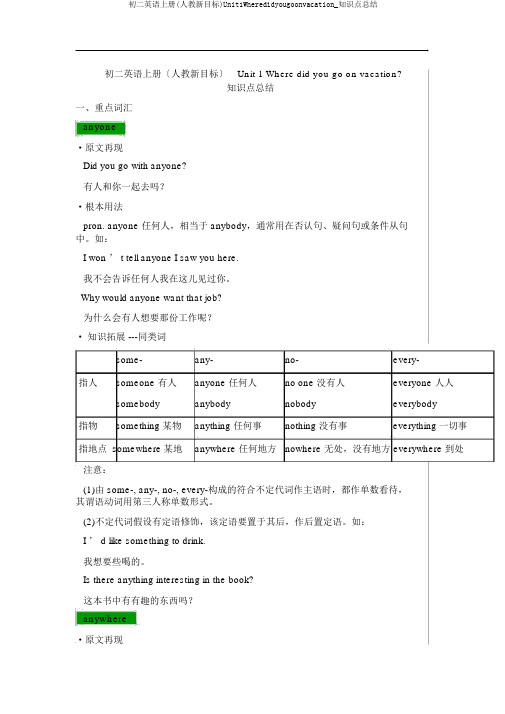
初二英语上册〔人教新目标〕Unit 1 Where did you go on vacation?知识点总结一、重点词汇anyone·原文再现Did you go with anyone?有人和你一起去吗?·根本用法pron. anyone 任何人,相当于 anybody,通常用在否认句、疑问句或条件从句中。
如:I won ’ t tell anyone I saw you here.我不会告诉任何人我在这儿见过你。
Why would anyone want that job?为什么会有人想要那份工作呢?·知识拓展 ---同类词some-any-no-every-指人someone 有人anyone 任何人no one 没有人everyone 人人somebody anybody nobody everybody指物something 某物anything 任何事nothing 没有事everything 一切事指地点 somewhere某地anywhere 任何地方nowhere 无处,没有地方 everywhere 到处注意:(1)由 some-, any-, no-, every-构成的符合不定代词作主语时,都作单数看待,其谓语动词用第三人称单数形式。
(2)不定代词假设有定语修饰,该定语要置于其后,作后置定语。
如:I ’ d like something to drink.我想要些喝的。
Is there anything interesting in the book?这本书中有有趣的东西吗?anywhere·原文再现Oh,did you go anywhere interesting?哦,你去过某个有趣的地方吗?·根本用法adv./pron. anywhere 什么地方,任何地方,常用在否认句或疑问句中。
肯定句中常用 somewhere,其修饰词也常常放在其后面。
Unit1WheredidyougoonvacationSectionA3a3c精品教学案(新人教版八年级上)
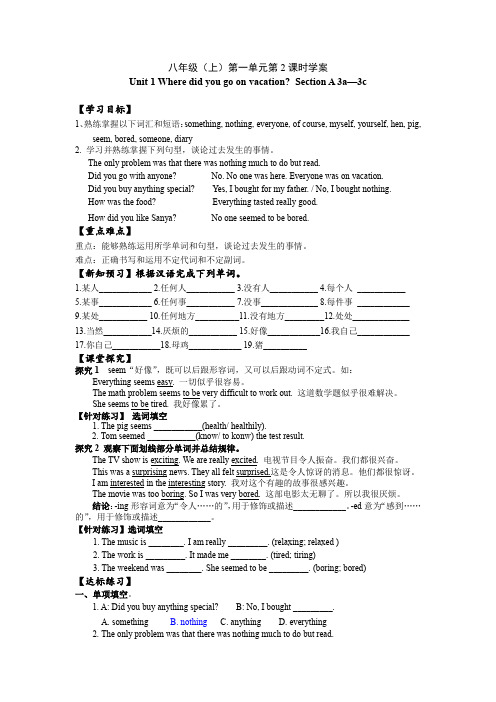
八年级(上)第一单元第2课时学案Unit 1 Where did you go on vacation?Section A 3a—3c【学习目标】1、熟练掌握以下词汇和短语:something, nothing, everyone, of course, myself, yourself, hen, pig,seem, bored, someone, diary2. 学习并熟练掌握下列句型,谈论过去发生的事情。
The only problem was that there was nothing much to do but read.Did you go with anyone? No. No one was here. Everyone was on vacation.Did you buy anything special? Yes, I bought for my father. / No, I bought nothing.How was the food? Everything tasted really good.How did you like Sanya? No one seemed to be bored.【重点难点】重点:能够熟练运用所学单词和句型,谈论过去发生的事情。
难点:正确书写和运用不定代词和不定副词。
【新知预习】根据汉语完成下列单词。
1.某人____________2.任何人___________3.没有人___________4.每个人___________5.某事____________6.任何事___________7.没事_____________8.每件事____________9.某处___________ 10.任何地方__________11.没有地方_________12.处处_____________ 13.当然___________14.厌烦的___________ 15.好像____________16.我自己____________ 17.你自己___________18.母鸡____________ 19.猪__________【课堂探究】探究1 seem“好像”,既可以后跟形容词,又可以后跟动词不定式。
人教新目标版英语八上Unit1《Wheredidyougoonvacation》精美说课稿
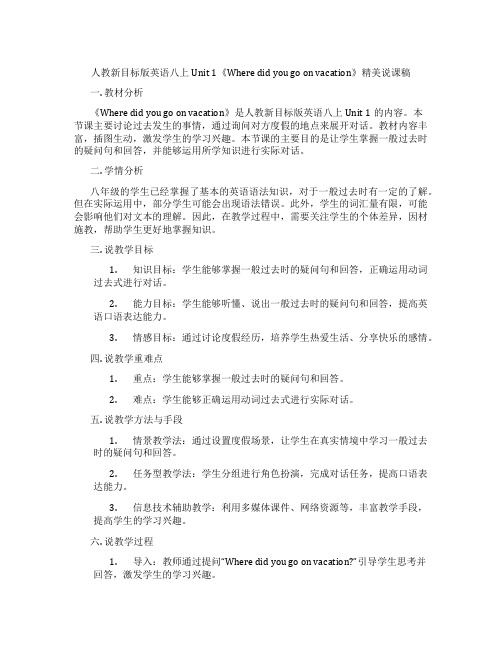
人教新目标版英语八上Unit 1《Where did you go on vacation》精美说课稿一. 教材分析《Where did you go on vacation》是人教新目标版英语八上Unit 1的内容。
本节课主要讨论过去发生的事情,通过询问对方度假的地点来展开对话。
教材内容丰富,插图生动,激发学生的学习兴趣。
本节课的主要目的是让学生掌握一般过去时的疑问句和回答,并能够运用所学知识进行实际对话。
二. 学情分析八年级的学生已经掌握了基本的英语语法知识,对于一般过去时有一定的了解。
但在实际运用中,部分学生可能会出现语法错误。
此外,学生的词汇量有限,可能会影响他们对文本的理解。
因此,在教学过程中,需要关注学生的个体差异,因材施教,帮助学生更好地掌握知识。
三. 说教学目标1.知识目标:学生能够掌握一般过去时的疑问句和回答,正确运用动词过去式进行对话。
2.能力目标:学生能够听懂、说出一般过去时的疑问句和回答,提高英语口语表达能力。
3.情感目标:通过讨论度假经历,培养学生热爱生活、分享快乐的感情。
四. 说教学重难点1.重点:学生能够掌握一般过去时的疑问句和回答。
2.难点:学生能够正确运用动词过去式进行实际对话。
五. 说教学方法与手段1.情景教学法:通过设置度假场景,让学生在真实情境中学习一般过去时的疑问句和回答。
2.任务型教学法:学生分组进行角色扮演,完成对话任务,提高口语表达能力。
3.信息技术辅助教学:利用多媒体课件、网络资源等,丰富教学手段,提高学生的学习兴趣。
六. 说教学过程1.导入:教师通过提问“Where did you go on vacation?”引导学生思考并回答,激发学生的学习兴趣。
2.新课呈现:教师展示教材插图,介绍一般过去时的疑问句和回答。
3.课堂活动:学生分组进行角色扮演,完成对话任务,教师巡回指导。
4.巩固练习:学生进行小组竞赛,看哪个小组能够在最短时间内完成一般过去时的疑问句和回答。
人教版八年级英语上册-Unit1-教案

人教版义务教育教科书◎英语八年级上册Unit1Wheredidyougoonvacation?教材解读本单元的核心话题是用一般过去时谈论度假等发生在过去的事情。
因此“Wheredid yougoonvacation?〞“Didyougotothebeach?Yes,Idid/No,Ididn’t.〞等是教学的重点。
通过对本单元的学习,学生能掌握本单元出现的地点名词,用于询问和答复过去发生的事情的短语和句型。
单元目标一、知识与技能1.词汇:NewYorkCity,CentralPark,exam,were,rainy,delicious,expensive, inexpensive,crowded,flew,kite,later,felt,little,corner,discuss,etc.2.句型:Wheredidyougoonvacation?Iwenttosummercamp.DidshegotoCentralPark?Yes,shedid.No,shedidn.’t3.语法:一般过去时的特殊疑问句、一般疑问句及肯、否认答复。
4.能力目标:能用一般过去时熟练谈论假期发生的事。
二、过程与方法灵活运用教材,从所教学生的实际水平和语言能力出发,调整和取舍教学内容,合理安排本单元的课时数,设计好每课时的教学内容。
三、情感、态度与价值观1.通过描述假期发生的事,增进同学间的了解,增进感情。
2.通过图片和视频欣赏优美的风景,培养热爱祖国大好河山的思想感情,提高学生的环保意识。
3.了解自己的能力,培养情操4.培养学生们对英语的兴趣。
教法导航1.以任务型教学作为课堂教学理念、利用整体语言教学法、情景教学法、交际教学法等。
2.在教学中创设切实可行的任务型教学活动、突出交际性。
3.教师为主导、学生为主体、任务为根底,注重实用性。
4.引趣激趣策略,创设情景调节气氛,引发激发学生兴趣。
1教师备课系统──多媒体教案学法导航多读善思,小组合作、探究、学习、交流。
八年级英语上册Unit1WheredidyougoonvacationPeriod3S
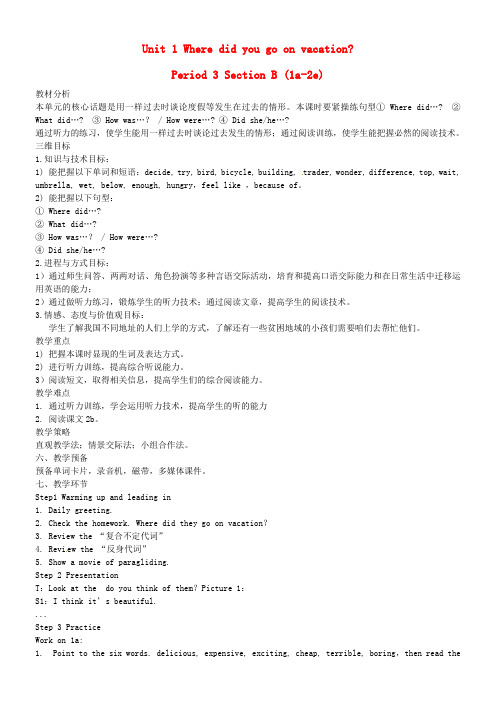
Unit 1 Where did you go on vacation?Period 3 Section B (1a-2e)教材分析本单元的核心话题是用一样过去时谈论度假等发生在过去的情形。
本课时要紧操练句型① Where did…? ②What did…? ③ How was…? / How were…? ④ Did she/he…?通过听力的练习,使学生能用一样过去时谈论过去发生的情形;通过阅读训练,使学生能把握必然的阅读技术。
三维目标1.知识与技术目标:1) 能把握以下单词和短语:decide, try, bird, bicycle, building, trader, wonder, difference, top, wait, umbrella, wet, below, enough, hungry,feel like ,because of。
2) 能把握以下句型:① Where did…?② What did…?③ How was…? / How were…?④ Did she/he…?2.进程与方式目标:1)通过师生问答、两两对话、角色扮演等多种言语交际活动,培育和提高口语交际能力和在日常生活中迁移运用英语的能力;2)通过做听力练习,锻炼学生的听力技术;通过阅读文章,提高学生的阅读技术。
3.情感、态度与价值观目标:学生了解我国不同地址的人们上学的方式,了解还有一些贫困地域的小孩们需要咱们去帮忙他们。
教学重点1) 把握本课时显现的生词及表达方式。
2) 进行听力训练,提高综合听说能力。
3)阅读短文,取得相关信息,提高学生们的综合阅读能力。
教学难点1. 通过听力训练,学会运用听力技术,提高学生的听的能力2. 阅读课文2b。
教学策略直观教学法;情景交际法;小组合作法。
六、教学预备预备单词卡片,录音机,磁带,多媒体课件。
七、教学环节Step1 Warming up and leading in1. Daily greeting.2. Check the homework. Where did they go on vacation?3. Review the “复合不定代词”4. Revi ew the “反身代词”5. Show a movie of paragliding.Step 2 PresentationT:Look at the do you think of them?Picture 1:S1:I think it’s beautiful....Step 3 PracticeWork on 1a:1. Point to the six words. delicious, expensive, exciting, cheap, terrible, boring,then read thewords and let Ss read after the teacher.2. Point to the last picture and say: This is a cake. It’s delicious. Then do the same thing for all six pictures.3. Let Ss match each word with a picture. Then check the answers with the students.…Work on 1b:1. Explain the meaning of “words” and “ words.”2. Let Ss discuss the words they know and write them down on the line.3. Let some Ss read out their words to the class. (Or let some Ss write their words on the blackboards.) Step 4 ListeningWork on 1c:1. T: Now let's work on 1c. First, let one student read the questions aloud. Make sure all the Ss know the meanings of the questions.2. Play the recording for the first time. Ss only listen.3. Then play the recording for the second time. Ss listen and an swer the questions.4. Then play the recording for the third time for the Ss to check the answers.5. Ss listen to the tape and circle the words and phrases they hear.6. Check the an swers: (Look at the big screen.)Work on 1d:1. Tell Ss this time they have to write down what Lisa said about her vacation, the people, the fun park, the food and the store.2. Then play the recording for the second time. Ss listen and write down the words.3. Then play the recording for the third time for the Ss to check the answers.听力指导:在听时要抓重点内容。
人教新目标版八年级英语上册Unit1Wheredidyougoonvacation教案 3

Unit1Wheredidyougoonvacation?教学目标:Teachingaims:1.知识与能力目标:1).学会谈论过去发生的事件,巩固学习一般过去时的用法,尤其是一般过去时中对地点的提问及回答。
2).学习掌握有关复合不定代词和地点副词的用法。
3).掌握有关描述性的形容词,并学会运用be+形容词来评价事物。
2.过程与方法目标:通过运用本单元的目标语言,能够正确使用复合不定代词和地点副词,运用描述性形容词描述过去的旅游经历,进一步巩固一般过去时。
3.情感态度与价值观:通过本单元所学内容,学会合理安排自己的假期生活,保留对过去的美好回忆,珍惜现在。
SectionA第一课时(1a-2b)一、课型:新课二、教学重难点:1).巩固复习一般过去时。
2).学习有关复合不定代词和地点副词的用法。
三、教学准备:多媒体,录音机四.教学过程:1.课前预习:预习1a-2b.2.正课教授(1)引入T:Hello,everyone!Howwasyoursummervacation?Ss:...T:Wheredidyougoonvacation?(askonestudenttoanswer)S1:... T:Howwasyourtrip?Whodidyougowith?S1:...Then,studentscanaskeachotherthesamequestionstoknowtheirt rips.(2)语言知识详细讲解1.有关单词、短语:stayathome,gotothemountains,gotoNewYorkCity,gotosummercamp,studyfortests,2.句型:-Wheredidyougoonvacation?-Iwenttothemountains-Didyougowithanyone?-Didyoubuyanythingspecial?3.复合不定代词:①复合不定代词和地点副词的构成:由some,any,no,every分别加上-body,-thing,-one构成的不定代词叫做复合不定代词;加上-where 构成副词。
人教版新目标八年级英语上册课文翻译

八年级上册参考译文Unit1WheredidyougoonvacationSectoinB2b7月15日,星期一1.今天早上我和家人抵达马来西亚槟城;2.天气晴朗炎热,于是我们决定去宾馆附的海滩;3.我和姐姐尝试了滑翔伞运动,我感觉自己就像一只鸟;这太令人兴奋了4.午饭我们吃了非常特殊的东西——马来黄面,可真是好吃呀5.下午,我们骑自行车去了乔治市;6.如今那里有许多新的建筑,但是许多老房子依然还在;7.在乔治市的一处古老的地方——海墘街,我们看到了一百年前中国商人们的房子;8.我在想这里过去的生活是什么样子呢;漫步在乔治市真是很享受;7月16日,星期二9.一天的差异是多么大呀10.我和爸爸决定今天登槟城山;11.我们本想徒步到山顶,但是天下起了小雨,于是我们决定乘坐火车;12.因为人太多,我们等了一个多小时的火车;13.当我们到达山顶的时候,雨下得很大;14.我们没有带雨伞,结果我们被淋得又湿又冷,真实糟透了15.并且因为糟糕的天气,底下的东西我们什么都看不到;16.爸爸没有带足够的钱,所以我们只吃了一碗米饭和鱼;因为我太饿了,饭的味道尝起来还真是不错Unit2Howoftendoyouexercise第五中学的学生们在课余时间做什么17.上个月,我们询问了我们的学生一些有关课余活动的问题;18.我们的问题是有关锻炼、使用网络,以及看电视;以下是所获得的结果;19.我们发现我们的学生中只有百分之十五每天锻炼;百分之四十五的学生一周锻炼四至六次;百分之二十的学生一周只锻炼一至三;还有百分之二十的学生根本就不锻炼20.我们都知道许多学生经常上网,但是让我们惊讶的是,有百分之九十的人每天使用网络,另外百分之十的学生每周至少使用网络三至四次;绝大多数学生上网娱乐,并非为了做功课;21.对我们提出的有关看电视的问题的回答也颇有意思;只有百分之二的学生一周看一直三次电视,百分之十三的人一星期看四至六次电视;另外百分之八十五的人每天都看电视虽然许多学生喜欢观看体育节目,但游戏类节目却是最受欢迎的;22.通过使用网络或观看游戏类节目来放松是件好事,但我们认为最佳的放松方式是通过锻炼;它有益于身心的健康;23.诸如参加体育运动这样的锻炼方式不但有趣,而且当你和朋友、家人一起运动时,你们还可以共度时光;24.请记住:”旧习难改;”所以赶快锻炼起来,不要等到来不及了;Unit3I’mmoreoutgoingthanmysister.25.杰夫.格林:我妈妈告诉我好朋友就像一面镜子;26.我比大多数孩子要安静持重,这便是我喜欢看书而且在班上学习更加努力的原因;27.我的好朋友袁力也不太说话,所以我们喜欢一块学习;28.我比较腼腆,所以我不那么容易交上朋友,但我想朋友就像书籍一样—他们不在多而贵在好;29.黄磊:没有必要什么都一样;我最要好的朋友拉里就与我相当不同,他比我高大而且更加外向;30.我们俩都喜欢运动,但他网球打得更好,所以总赢;31.然而,拉里经常能够帮我激发出自己的所能,所以我的网球也打得越来越好;32.不过,拉里学习远不如我用功;我的成绩总是比他好,也许我应当多帮帮他;33.玛丽.史密斯:我并不十分在乎我的朋友跟我一样或与我不同;34.我最喜欢的名言是“一个真正的朋友是在需要时给你帮助,使你感到;”35.我最好的朋友卡罗尔确实善良,而且颇有意思;事实上,她比我认识的任何一个人都有意思;去年我摔断了胳膊,但她逗我开怀大笑,并让我感觉好起来;36.我们无所不谈,可以分享任何东西;我知道她关心我,因为她随时都能够听我倾诉;Unit4Where’sthebestmovietheater谁是达人37.每个人都有一技之长,但有的人真的是非常有才;38.看别人展示他们的才能总是非常有趣的,所以才艺展示节目越来越受欢迎;39.起初,美国有“美国偶像”和“美国达人秀”这样的节目;现在,世界各地都有类似的节目,比如“中国达人秀”;40.所有的节目都有一个共同点:他们试图找到最好的歌手、最有天赋的舞者、最令人激动的魔术师、最滑稽的演员等等;41.各种各样的人都可以参加这个节目;但谁钢琴谈得最好谁唱歌唱得最优美那有你自己来决定;42.人们看这类节目的时候,通常承担着评判优胜者的角色;而且,获胜者总是能得到丰厚的奖赏;43.然而,并不是每个人都喜欢看这类节目;44.有的人认为表演者的生活是杜撰出来的;比如就有人说自己是家境贫寒的农民,但事实上他们是演员;45.但是如果你不把这些节目太当回事,它们还是有看头的;46.而且有一点比较好,就是它们给人们提供了一条实现自己梦想的道路;Unit5Doyouwanttowatchagameshow47.当人们说起“文化”这个词,我们通常会想到艺术和历史;48.但是在美国文化中有一个非常着名的象征,那就是“卡通片”;49.我们都知道并喜爱那只长着一对又大又圆的耳朵的黑色老鼠——米老鼠;50.80多年前,他第一次出现在卡通片威利号汽船中;这部卡通片1928年11月28日在纽约上映,成为第一部带有配音和音乐的卡通片;51.米老鼠的幕后之人便是沃尔特.迪斯尼;后来他变得非常富有和成功;在20世纪30年代,他制作了87部米老鼠卡通片;52.有些人可能会问:为什么这个卡通动物形象如此受欢迎;53.其中一个主要原因是米老鼠就像一个普通人,但他在面对各种危险时总是想尽一切办法;54.在他早期的影片中,米老鼠没有你们幸运,总是遇到各种问题,比如失去房子或者女朋友——米妮;55.然而,他总是准备好去尽其所能;人们去电影院看这个“小人物”如何获胜;很多人都想成为米老鼠那样的人;56.1978年11月18日,米老鼠成为好莱坞星光大道上拥有一颗星星的一个卡通形象;57.现在的卡通片通常不再像米老鼠那样简单,但大家依然知道并喜爱米老鼠;谁还有一对比米老鼠更着名的耳朵呢Unit6I’mgoingtostudycomputerscience.SectoinB2b58.你知道决心是什么吗决心就是一种承诺;59.很多时候,我们对他人许下承诺;“妈妈,我保证我从学校回来后立即整理自己的房间;”60.然而,你对自己许下的承诺就叫做决心;其中最常见的一种就是新年计划;61.一年的开始常常是制定计划的时候;我们在新年伊始制定计划时,希望我们的生活变得更好;62.有人把他们来年的打算和计划写下来;这能帮助他们记住自己的计划;其他人则把他们的愿望和计划告诉家人和朋友;63.决心有很多种;64.其中一些与身体健康有关;例如,有些人跟自己承诺,他们将开始某种锻炼或少吃快餐;65.很多决心是关于自我提升的;这些决心是为了让自己成为一个更优秀的人;66.人可能会说,他们将开始培养某种兴趣爱好,比如画画、摄影、学弹吉他;67.还有些决心与合理的时间规划相关,比如制定一周学习计划;例如,一个学生可能需要安排更多的时间用来学习;68.尽管决心各种各样,但它们大多数拥有一个共同的特点:那就是人们很少能够遵守它们69.这其中还有很充分的原因;有时是因为决心太难而无法实施,有时人们干脆把它们抛在脑后;70.因此有人就说,没计划就是最好的计划;那你呢来年你会制定计划吗Unit7WillpeoplehaverobotsSectoinB2b71.在观看关于未来的电影时,我们有时会看见机器人;72.通常它们像人类的佣人;它们帮着做家务,或者在肮脏或危险的地方干活;73.现在已经有机器人在工厂里干活了;74.有些机器人能帮我们制造汽车,并且它们反复地干着简单的工作;75.将来做这样的工作的人会更少,因为它们很枯燥,但是机器人永远不会感到厌烦;76.科学家们正在努力使得机器人看上去像人,并且与我们做同样的事情;77.在日本,有些机器人会走路、跳舞;这种机器人看起来很有趣;78.但是,一些科学家认为,尽管我们能够让机器人像人一样活动,却很难让它们像人类那样思考;79.例如,科学家詹姆斯.怀特认为,机器人永远不可能像人一样醒来后知道自己在哪里;80.但是,很多科学家不同意怀特先生的观点;他们认为在25到50年之后,机器人甚至能够像人类那样说话;81.一些科学家相信,未来会有更多的机器人;然而,他们认为这可能需要数百年的时间;82.这些新型的机器人将会有很多不同的形状,有的会看起来像真人,其他的可能看起来像动物;83.比如,在印度,科学家们已经制造出像蛇一样的机器人;如果建筑物倒塌了,并且还有人在里面,这些蛇形机器人能够帮助搜寻埋在建筑物下面的人;84.这在20年前还是不可能的事,不过在100年以前,电脑、火箭看上去似乎也是不可能的;我们永远不知道未来会发生什么事\Unit8HowdoyoumakeabananamilkshakeSectoinB,2b美国的感恩节85.在大多数国家,人们通常在特殊的节日里吃传统食物;86.在美国,感恩节就是这样一个特殊的日子;感恩节总是在每年十一月份的第四个周四,这也是人们感谢秋季所获得的食物的时刻;87.此时,人们也回忆起约400年前从英国迁来美国生活的首批旅行者;88.这些旅行者度过了一个漫长而又艰难的冬季,他们中很多人死去了;89.在接下来的那个秋天,他们为在新的家园能够活下来并且获得了食物而感恩;90.现在,大多数美国人依然通过和家人团聚吃大餐的方式来纪念这种感恩的思想;91.感恩节大餐中的主菜几乎总是火鸡一种大型的禽类;92.做火鸡下面是感恩节大餐中火鸡的一种烹饪方法:93..首先,将一片面包屑、洋葱、盐和胡椒粉混合在一起;94..接着,将上述含有面包屑的混合物放在火鸡肚子里;95..然后,将火鸡放到烤箱中烹制数小时;96..火鸡熟后,把火鸡放到一个大盘子上,浇上肉汁;97..最后,将火鸡切成薄片,就着胡萝卜和土豆之类的蔬菜吃肉;Unit9 CanyoucometomypartySectoinB,2b98.你好,戴维:好主意我真的特别喜欢斯蒂恩小姐;她帮我把英语提高了那么多;99.她要离开我很难过;这个送别会的确是表达“感谢”和说“再见”的最好办法;100.我可以帮忙买些食物和饮料;我还可以把斯蒂恩小姐带到欢送会,至于怎么做我已经有个好办法了啦;101.嗨,戴维,非常感谢你策划这个欢送会我很愿意参加,但是我那天没有时间;102.这个月底我们全家要去武汉看我的叔叔和婶婶;103.不过我很乐意帮忙,为聚会做些准备,比如设计些小游戏;如果需要我帮忙,就告诉我吧;104.亲爱的同学们:我相信你们现在都知道这个消息了,那就是我们最亲爱的老师—斯蒂恩小姐很快就要离开回美国去了;105.她要走我们很难过,因为她实在是一位有趣的老师;为了表达我们将会非常想念她,让我们下周五28号为她举办一个惊喜派对吧;106.你们能来吗如果能来,是否能帮忙做下面的事情呢1)买些食物和饮料;2)策划一些小游戏;3)准备游戏需要的用品胶水、纸、钢笔等......4)将斯蒂恩小姐带到欢送会,但事先不要告诉她,这样她才能感到惊喜; 107.期待你们大家的回复;Unit10Ifyougototheparty,you’llhaveagreattimeSectoinB,2b108.如今的学生经常有很多的烦恼;有时他们的问题与学习有关,有时与朋友有关;109.面对这些问题,他们能做什么呢有人认为最糟糕的是什么也不做;110.来自伦敦的女孩劳拉.米勒就同意这一观点;“生活中的问题和烦恼是正常的,”劳拉说:“但我认为找人倾诉很有帮助;如果我们不找人聊聊,肯定会感觉更糟;”111.有一次劳拉把钱包丢了,好几天心神不安;112.她不敢告诉父母这件事;她甚至每天步行三英里到学校,因为她没钱乘车;113.她一直在想:“如果我告诉父母,他们会生气的114.最后,她告诉了父母这件事,他们非常理解;115.他爸爸说,他自己有时也因为粗心犯错误;116.他们给她买了一个新钱包,还让她再小心些;117.我会永远记得以后与人分享自己的问题;”劳拉说;118.罗伯特.亨特就一些常见问题给学生提供建议;他与劳拉有同感;119.最好不要逃避我们的问题;我们总是应该想办法解决它们;120.他认为第一步是找个信任的人倾诉;这个人不必是像他这样的专家;121.学生们经常会忘记,他们的父母有更多经验,并且总是乐于帮助他们;122.在英语中,我们与人分担一个烦恼就像把麻烦分成两半;123.因此,你只要跟人聊聊这个问题,你就已经解决了问题的一半。
八年级英语上册unit1-wheredidyougoonvacation

八年级英语第一次课-Unit 1-Where did you go on vacation?重要知识点讲解【一览无余】考点一Where did you go on vacation?含有行为动词的一般疑问句与特殊疑问句的区别与构成区别:一般疑问句是用来询问事情的真实性,所以一般情况下有两种回答方式:Yes,...或No,...。
而特殊疑问句是具体的对句中的某一成分进行提问,所以回答时,不能用Yes,...或No,...来回答,而应回答出具体的内容。
E.g. -Did you go to the Great Wall on vacation? -Yes,I did./No,I didn’t.-Where did you go on vacation? -The Great Wall./I went to the Great Wall.构成:陈述句:I went to the Great Wall with my mother by bike on summer vacation.①②③○4.一般疑问句:Did you go to the Great Wall with your mother by bike on summer vacation?特殊疑问句①:Where did you go with your mother by bike on summer vacation?(补全对话常用句)特殊疑问句②:Who did you go to the Great Wall with by bike on summer vacation?特殊疑问句③:____________________________________________________?特殊疑问句○4.:____________________________________________________?考点二Did you buy anything special? 你买了一些特别的东西吗?识记:不定代词something 一些事情(用于)、anything 一些事情(用于)、everything 所有事情nothing 没有事情somebody/someone 一些人(用于)、anybody/anyone 一些人(用于)、everybody/everyone 所有人nobody/no one 没有人用法:(1)不定代词用作主语时,谓语动词用单数:Something is wrong with my bike. 我的自行车出了些问题。
Unit 1Where did you go on vacation 第三课时

yourself? Alice: I didn’t really see a_n_y_t_h_i_n_gI liked.
He thought everything tasted really good.
She bought nothing for her father. 类似的词:
someoTnhee small heevnerwyeonnteto a mountain. She bought nnoootnheing forahneyrofnaether. She seeme..d...t.o be bored. 不定代词
Indefinite pronouns 不定代词
somebody anybody
某人
任何人
nobody everybody
没有人
每人
someone 某人
anyone 任何人
no one 没有人
everyone 每人ຫໍສະໝຸດ something anything nothing everything
某物
任何事 没有东西 每一件事
wvaitchattihoenw, Aorlidcse?? Let’s try!
Alice: Yes, I did. I went to Sanya.
Linda: How did you like it?
Alice: Well, it was my first time there, so _ev_e_r_y_t_h_i_n_g was really interesting.
人教版新目标八年级英语上册课文翻译完整版
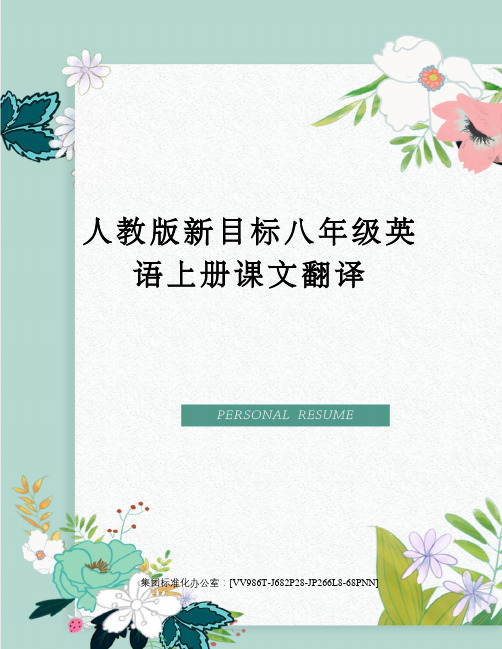
人教版新目标八年级英语上册课文翻译集团标准化办公室:[VV986T-J682P28-JP266L8-68PNN]八年级上册参考译文Unit1WheredidyougoonvacationSectoinB2b7月15日,星期一1.今天早上我和家人抵达马来西亚槟城。
2.天气晴朗炎热,于是我们决定去宾馆附的海滩。
3.我和姐姐尝试了滑翔伞运动,我感觉自己就像一只鸟。
这太令人兴奋了!4.午饭我们吃了非常特殊的东西——马来黄面,可真是好吃呀!5.下午,我们骑自行车去了乔治市。
6.如今那里有许多新的建筑,但是许多老房子依然还在。
7.在乔治市的一处古老的地方——海墘街,我们看到了一百年前中国商人们的房子。
8.我在想这里过去的生活是什么样子呢。
漫步在乔治市真是很享受。
7月16日,星期二9.一天的差异是多么大呀!10.我和爸爸决定今天登槟城山。
11.我们本想徒步到山顶,但是天下起了小雨,于是我们决定乘坐火车。
12.因为人太多,我们等了一个多小时的火车。
13.当我们到达山顶的时候,雨下得很大。
14.我们没有带雨伞,结果我们(被淋得又湿又冷,真实糟透了!15.并且因为糟糕的天气,底下的东西我们什么都看不到。
16.爸爸没有带足够的钱,所以我们只吃了一碗米饭和鱼。
因为我太饿了,饭的味道尝起来还真是不错Unit2Howoftendoyouexercise?第五中学的学生们在课余时间做什么?17.上个月,我们询问了我们的学生一些有关课余活动的问题。
18.我们的问题是有关锻炼、使用网络,以及看电视。
以下是所获得的结果。
19.我们发现我们的学生中只有百分之十五每天锻炼。
百分之四十五的学生一周锻炼四至六次。
百分之二十的学生一周只锻炼一至三。
还有百分之二十的学生根本就不锻炼!20.我们都知道许多学生经常上网,但是让我们惊讶的是,有百分之九十的人每天使用网络,另外百分之十的学生每周至少使用网络三至四次。
绝大多数学生上网娱乐,并非为了做功课。
八年级英语上册Unit1Wheredidyougoonvacation第3课时SectionB1a
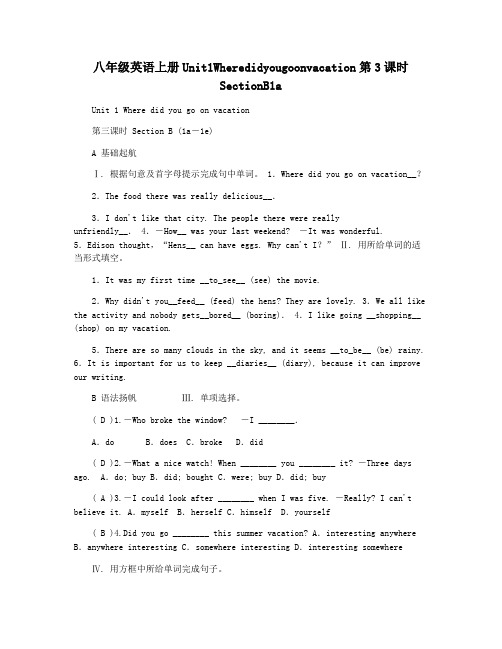
八年级英语上册Unit1Wheredidyougoonvacation第3课时SectionB1aUnit 1 Where did you go on vacation第三课时 Section B (1a-1e)A 基础起航Ⅰ. 根据句意及首字母提示完成句中单词。
1.Where did you go on vacation__?2.The food there was really delicious__.3.I don't like that city. The people there were reallyunfriendly__. 4.―How__ was your last weekend? ―It was wonderful. 5.Edison thought,“Hens__ can have eggs. Why can't I?” Ⅱ. 用所给单词的适当形式填空。
1.It was my first time __to_see__ (see) the movie.2.Why didn't you__feed__ (feed) the hens? They are lovely. 3.We all like the activity and nobody gets__bored__ (boring). 4.I like going __shopping__ (shop) on my vacation.5.There are so many clouds in the sky, and it seems __to_be__ (be) rainy. 6.It is important for us to keep __diaries__ (diary), because it can improve our writing.B 语法扬帆Ⅲ. 单项选择。
( D )1.―Who broke the window? ―I ________.A.do B.does C.broke D.did( D )2.―What a nice watch! When ________ you ________ it? ―Three days ago. A.do; buy B.did; bought C.were; buy D.did; buy( A )3.―I could look after ________ when I was five. ―Really? I can't believe it. A.myself B.herself C.himself D.yourself( B )4.Did you go ________ this summer vacation? A.interesting anywhere B.anywhere interesting C.somewhere interesting D.interesting somewhereⅣ. 用方框中所给单词完成句子。
